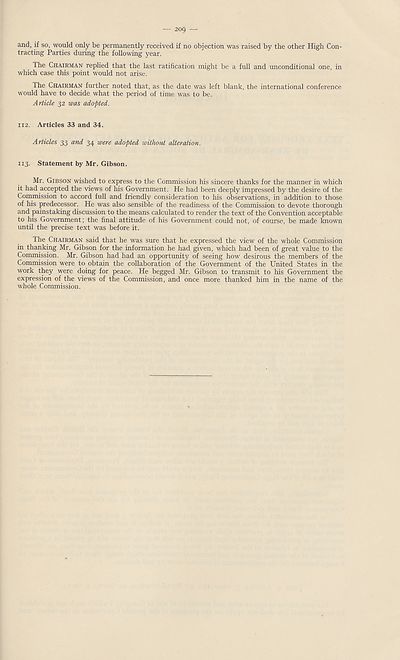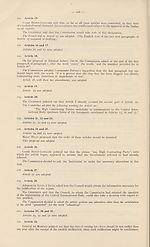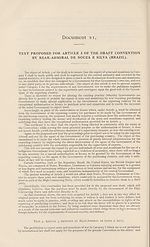Armament > Conference for the control of the international trade in arms, munitions and implements of war
(211)
Download files
Complete book:
Individual page:
Thumbnail gallery: Grid view | List view

— 209 —'
and, if so, would only be permanently received if no objection was raised by the other High Con¬
tracting Parties during the following year.
The Chairman replied that the last ratification might be a full and unconditional one, in
which case this point would not arise.
Ihe Chairman further noted that, as the date was left blank, the international conference
would have to decide what the period of time was to be.
Article 32 was adopted.
112. Articles 33 and 34.
Articles 33 and 34 were adopted without alteration.
113. Statement by Mr. Gibson.
Mr. Gibson wished to express to the Commission his sincere thanks for the manner in which
it had accepted the views of his Government. He had been deeply impressed by the desire of the
Commission to accord full and friendly consideration to his observations, in addition to those
of his predecessor. He was also sensible of the readiness of the Commission to devote thorough
and painstaking discussion to the means calculated to render the text of the Convention acceptable
to his Government; the final attitude of his Government could not, of course, be made known
until the precise text was before it.
The Chairman said that he was sure that he expressed the view of the whole Commission
in thanking Mr. Gibson for the information he had given, which had been of great value to the
Commission. Mr. Gibson had had an opportunity of seeing how desirous the members of the
Commission were to obtain the collaboration of the Government of the United States in the
work they were doing for peace. He begged Mr. Gibson to transmit to his Government the
expression of the views of the Commission, and once more thanked him in the name of the
whole Commission.
and, if so, would only be permanently received if no objection was raised by the other High Con¬
tracting Parties during the following year.
The Chairman replied that the last ratification might be a full and unconditional one, in
which case this point would not arise.
Ihe Chairman further noted that, as the date was left blank, the international conference
would have to decide what the period of time was to be.
Article 32 was adopted.
112. Articles 33 and 34.
Articles 33 and 34 were adopted without alteration.
113. Statement by Mr. Gibson.
Mr. Gibson wished to express to the Commission his sincere thanks for the manner in which
it had accepted the views of his Government. He had been deeply impressed by the desire of the
Commission to accord full and friendly consideration to his observations, in addition to those
of his predecessor. He was also sensible of the readiness of the Commission to devote thorough
and painstaking discussion to the means calculated to render the text of the Convention acceptable
to his Government; the final attitude of his Government could not, of course, be made known
until the precise text was before it.
The Chairman said that he was sure that he expressed the view of the whole Commission
in thanking Mr. Gibson for the information he had given, which had been of great value to the
Commission. Mr. Gibson had had an opportunity of seeing how desirous the members of the
Commission were to obtain the collaboration of the Government of the United States in the
work they were doing for peace. He begged Mr. Gibson to transmit to his Government the
expression of the views of the Commission, and once more thanked him in the name of the
whole Commission.
Set display mode to:
![]() Universal Viewer |
Universal Viewer | ![]() Mirador |
Large image | Transcription
Mirador |
Large image | Transcription
Images and transcriptions on this page, including medium image downloads, may be used under the Creative Commons Attribution 4.0 International Licence unless otherwise stated. ![]()
| League of Nations > Armament > Conference for the control of the international trade in arms, munitions and implements of war > (211) |
|---|
| Permanent URL | https://digital.nls.uk/195384506 |
|---|
| Shelfmark | LN.IX |
|---|
| Description | Over 1,200 documents from the non-political organs of the League of Nations that dealt with health, disarmament, economic and financial matters for the duration of the League (1919-1945). Also online are statistical bulletins, essential facts, and an overview of the League by the first Secretary General, Sir Eric Drummond. These items are part of the Official Publications collection at the National Library of Scotland. |
|---|---|
| Additional NLS resources: |
|

